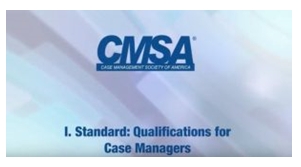 "Professional Case Managers Add Value to the Health Care System and Health Care Consumers"
On September 13-14, 2017, come to Capitol Hill with fellow CMSA members, CMSA’s Public Policy Committee and Board of Directors to play a direct role in the legislative process by meeting with your House and Senate representatives.
You’ll be able to highlight the critical role that case managers play in healthcare delivery, explore how to utilize your local networks for grassroots legislative success and ensure that case managers are speaking for case managers.
Attendance for the 2017 Day on the Hill is open to all current CMSA members. If you are a CMSA member who is passionate about association issues and wants to make a difference by advocating with fellow healthcare professionals from across the country, you won’t want to miss this event!
|

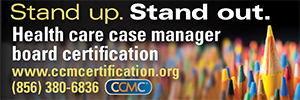
 Will it be our featured speakers, who will enable you to see new personal and professional opportunities? A destination event, taking you out of your day-to-day schedule to unwind and learn something new? Or, perhaps just the energy and sheer beauty of Austin?
Whatever you're looking for in a transformation, we'll have it for you this summer in Austin. There's still time to register for CMSA's 27th Annual Conference & Expo in Austin, TX, June 26-30, 2017.
|
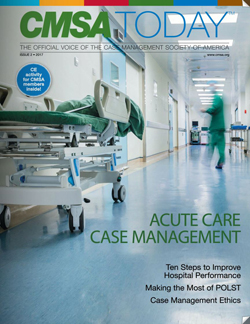 CMSA Today™—the official magazine of the Case Management Society of America—is the magazine for case managers. We are committed to providing case management knowledge, perspectives and news to case managers in all sectors of the profession. To facilitate that mission, we accept and consider: CMSA Today™—the official magazine of the Case Management Society of America—is the magazine for case managers. We are committed to providing case management knowledge, perspectives and news to case managers in all sectors of the profession. To facilitate that mission, we accept and consider:
- Original articles written by case managers of all healthcare backgrounds;
- Expertly prepared articles from professional writers—whether medical
writers or experienced generalists—on case management topics;
- Feature articles, column material, and news about case management
trends and issues, as well as about CMSA chapters and their activities;
- and personal, member-generated items considered nontraditional for a
professional-association publication as poems, remembrances and similar
sorts of content.
Consider sharing your knowledge by writing and submitting an article! Click below to learn more.
Learn More
|
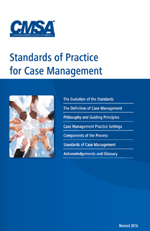
Download CMSA's Standards of Practice for Case Management, 2016 revision, which provides practice guidelines for the case management industry and its diverse stakeholders.The impetus for the 2016 revision of the Standards is the need to emphasize the professional nature of the practice and role of the case manager.
The 2016 Standards contain information about case management including an updated definition, practice settings, roles and responsibilities, case management process, philosophy and guiding principles, as well as the standards and how they are demonstrated.
Download Your Copy
|
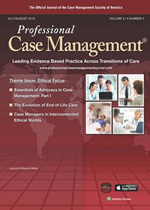 As part of your CMSA member benefits, you have access to discounted continuing education opportunities through our journal publishing partner, Lippincott Williams & Wilkins. Content is based on peer-reviewed Lippincott journals, trusted by nurses globally to provide current, evidence-based and authoritative content critical to everyday practice. As part of your CMSA member benefits, you have access to discounted continuing education opportunities through our journal publishing partner, Lippincott Williams & Wilkins. Content is based on peer-reviewed Lippincott journals, trusted by nurses globally to provide current, evidence-based and authoritative content critical to everyday practice.
All CE activities in Professional Case Management are discounted 25 percent. This includes CCMC, ANCC, NAHQ, and NASW contact hours. To access activities, take these steps:
1. Go to http://nursing.ceconnection.com/default. Log in using your NursingCenter.com user ID and password.
2. Visit http://nursing.ceconnection.com/browse/sources/28 and enter the offer code into the coupon field upon check out.
3. Complete check out and enjoy.
|

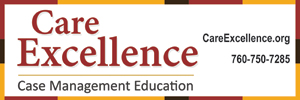
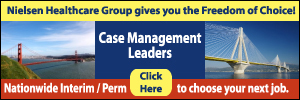
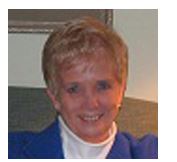 Pat Stricker, RN, MEd
Senior Vice President, TCS Healthcare Technologies
It has been eight years since the Health Information Technology for Economic and Clinical Health (HITECH) Act was enacted to stimulate the adoption of electronic health records (EHRs). When it was enacted in February 2009, healthcare providers were offered financial incentives for demonstrating "meaningful use" of EHRs. Meaningful use (MU) guidelines define minimum U.S. government standards for using EHRs and for exchanging patient data between healthcare providers, insurers, and patients.
The goals of meaningful use were to use EHR technology to improve quality, safety, and efficiency; reduce health disparities; engage patients and families; improve care coordination; improve population and public health; and maintain privacy and security of patient health information. As a result, it was hoped that clinical and population health outcomes would improve, transparency and efficiency would be increased, and more robust research data on health systems would be available.
|

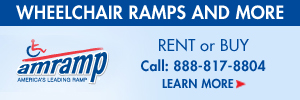
 Palliative Care Everywhere: A Conversation with Diane E. Meier, MD, FACP by Les C. Meyer, MBA
Community health leaders are seeking high-value transformation practices and change catalysts that reach into the community, support essential care coordination services and improve patient-directed engagement outcomes. Whether for individuals at their worksite or in the home, caregivers must learn to give and receive support to empower patients to live their best lives — regardless of their life stage.
Palliative care is one of the most direct ways to heal healthcare and advance the Quadruple Aim’s goals of improving outcomes (population health), patient experience and clinician experience and lowering costs. Effective and timely provision of advanced illness care coordination, "palliative care everywhere" improves the quality of care for patients, increases patient and family satisfaction scores and decreases the total cost of care — creating a collective impact opportunity to improve the care experience and realize high-value advanced illness care coordination outcomes across the continuum.
|
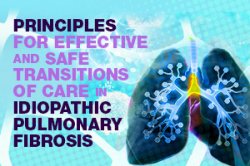
This program is approved for 1.0 CE for Nurses.
For many patients with idiopathic pulmonary fibrosis (IPF) and their
caregivers, the journey to diagnosis and appropriate management is often
riddled with gaps in care coordination and interprofessional
collaborative practice. With the goal of improving holistic transitions
of care to minimize hospitalizations and readmissions, and to ensure
incorporation of evidence-based treatment and management approaches,
this webcast brings to light core concepts of the IPF Transitions of
Care (TOC) Pathway that was recently developed in partnership with the
National Transitions of Care Coalition (NTOCC) and Case Management
Society of America (CMSA). Led by key members of the IPF TOC Pathway
Steering Committee, this webcast was designed to arm system leaders
and the IPF care team with essential interventions and tools to ensure
effective and safe transitions of care for patients with IPF across
healthcare settings.
Access the webcast here.
|
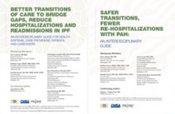 PRIME® is offering 2 hours of complimentary ACCME, ACPE, ANCC, and CCM credits for each Pathway. PRIME® is offering 2 hours of complimentary ACCME, ACPE, ANCC, and CCM credits for each Pathway.
To help ensure smooth care transitions for patients with PAH or IPF, PRIME® in collaboration with the NTOCC and CMSA have developed 2 new Transitions of Care Pathways with recommendations on actions that all participants in the healthcare delivery system can take. The instructional design and content for both Pathways is based on NTOCC/CMSA Transitions of Care Compendium resources. The tools and resources included in these pathways are intended to support interprofessional teams in ensuring safe and effective transitions of care that enable patients with IPF and PAH to achieve treatment goals and maintain a good quality of life.
Access the Pathways by clicking here.
|
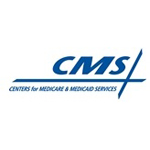 Last year, the Centers for Medicare & Medicaid Services (CMS) released a Funding Opportunity Announcement (FOA) for applications for the Center for Medicare and Medicaid Innovation’s (Innovation Center) Accountable Health Communities (AHC) model. Over a five-year period, CMS will implement and test the three-track AHC model to support local communities in addressing the health-related social needs of Medicare and Medicaid beneficiaries by bridging the gap between clinical and community service providers. Social needs include housing instability, food insecurity, utility needs, interpersonal violence and transportation.
On April 6, CMS announced the participants for two of the tracks, the Assistance and Alignment Tracks, of the AHC model. By addressing critical drivers of poor health and high health care costs, the model aims to reduce avoidable health care utilization, impact the cost of health care, and improve health and quality of care for Medicare and Medicaid beneficiaries. The organizations in the AHC Assistance Track will provide person-centered community service navigation services to assist high-risk beneficiaries with accessing needed services. The organizations in the AHC Alignment Track will also provide community service navigation services, as well as encourage community-level partner alignment to ensure that needed services and supports are available and responsive to beneficiaries’ needs.
Source: Centers for Medicare & Medicaid Services
|
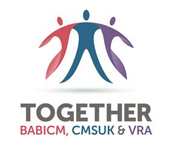 May 11-12, 2017 in Nottingham, U.K.
Are you in or near the U.K.? Join our counterparts across the pond for their upcoming international case management conference. There will be international speakers from Australia, Germany and the USA reflecting on their experiences and participating in interactive panel discussions. U.K. Keynote speakers from central policy bodies will give an update on current and future developments in their government’s rehabilitation agenda.
|
|
| |
|

